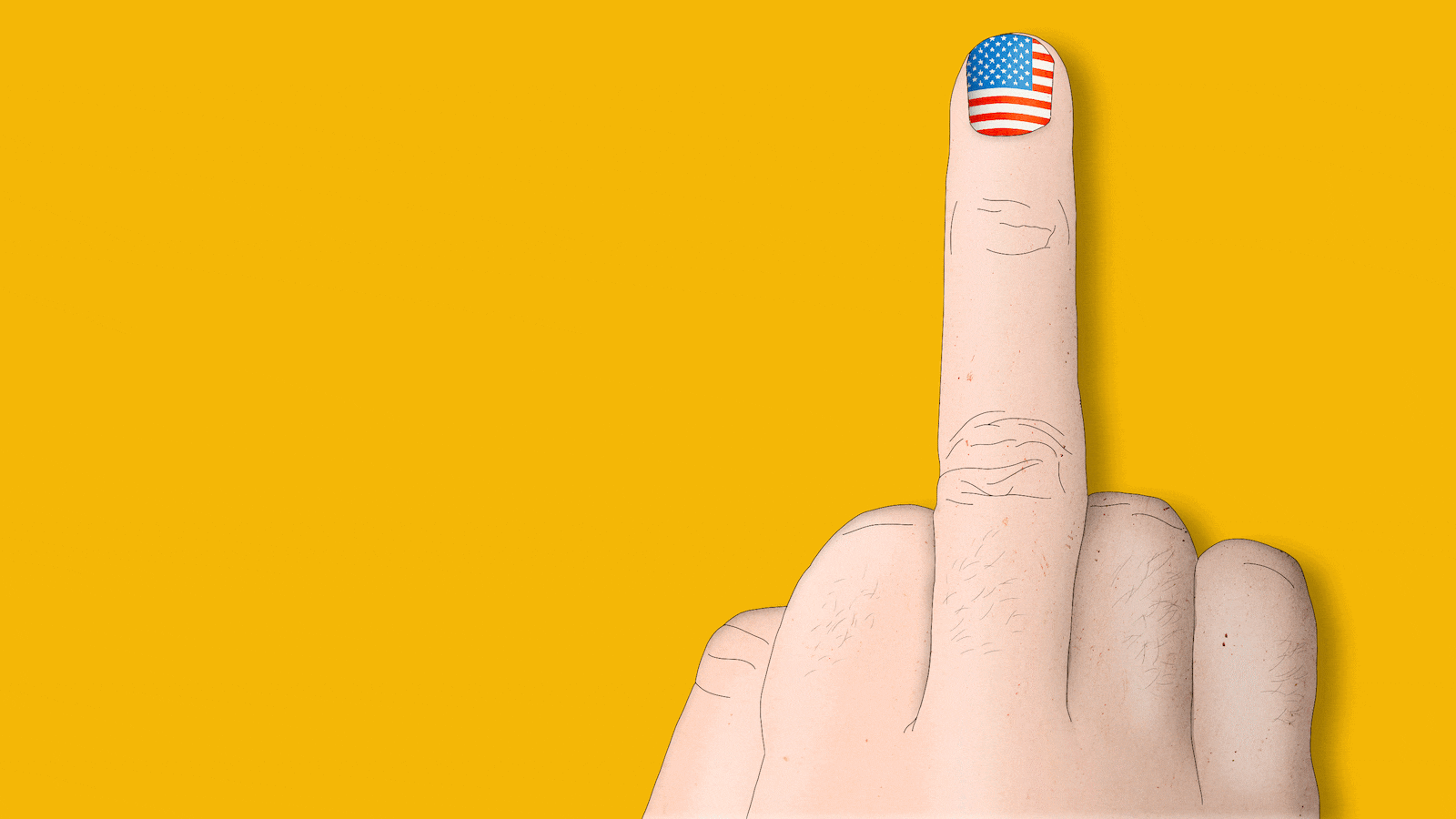As U.S. Marshal Raylan Givens (Timothy Olyphant) famously opined on Justified, “You run into an asshole in the morning, you ran into an asshole. You run into assholes all day, you’re the asshole.” Yet in a 2020 America on the precipice of a monumental presidential election, it seems that assholes are not only everywhere you turn—in newspapers, on cable TV, at political rallies and protests, and all over social media—but that they, and their behavior, has been normalized. It’s this “rising tide of assholery” that’s the focus of director John Walker’s Assholes: A Theory, which adapts philosophy professor Aaron James’ 2012 non-fiction book into a documentary aimed at both precisely defining the term “asshole,” and investigating how those who fit that bill have increasingly come to dominate key spheres of modern public life.
Donald Trump isn’t seen or mentioned once by name in Assholes: A Theory. Nonetheless, his specter looms large over Walker’s film (in theaters Oct. 30, and on VOD Nov. 6), whether during conversations about corrupt Italian Prime Minister Silvio Berlusconi—the forerunner of the media-manipulating populist-criminal-strongman trend that’s recently swept through Western nations—or passages discussing Facebook, Twitter and Google’s prioritization of profit over their responsibility to safeguard democracy from hate speech and disinformation. Without once bringing him up, Walker makes clear that Trump is the embodiment of this problem, given that his election to the highest office—and subsequent flouting of rules and standards of common decency—has made it appear acceptable, and in fact rewarding, to act in the worst possible manner as a means of achieving one’s selfish ends. He is, the film silently contends, the apex of American assholery.
To grasp that argument, one need only listen to Assholes: A Theory’s basic description of an asshole. As James states, “The asshole, as I define it, is the guy who allows himself special advantages in cooperative life out of an entrenched sense of entitlement that immunizes him against the complaints of other people.” In other words, he’s the individual—generally male, although as John Cleese candidly admits, his mother probably was one too—who thinks the general rules don’t apply to them because they’re somehow smarter, better, or more special than their fellow citizens. James’ example is a surfer who violates the right-of-way customs in the ocean. Yet the type is universal, whether in line at the grocery store, on the road in traffic, or at work. They’re the arrogant creeps convinced they’re fundamentally superior, and thus free to conduct themselves in whatever way they see fit.
The way they see fit, of course, is often hatefully, and after spending its early going delineating what it means by “asshole,” Assholes: A Theory dives into the many areas in which they thrive. That process begins with Sherry Lee Benson-Podolchuk, a former Royal Canadian Mounted Police officer who left her job after suffering harassment and discrimination from boorish male colleagues. When she subsequently wrote a book about her mistreatment (Women Not Wanted), she was further vilified by a police force that prized protecting its own—and upholding its ugly, sexist atmosphere—over doing the right thing. In the midst of ongoing protests and debate over America’s own domestic police culture, which has long had a tradition of closing ranks and demonizing critics, Benson-Podolchuk’s ordeal sounds eerily familiar.
Such attitudes, according to Assholes: A Theory, aren’t confined to law enforcement. Fraternities are breeding grounds for horrid group-think mindsets about women and sex. The financial sector encourages greed, ruthlessness, and vulgarity as the best way to get ahead. And the military champions initiation-ritual abuse in service of its own greater good. Using relevant clips from, respectively, Animal House, The Wolf of Wall Street and Full Metal Jacket, director Walker forwards the notion that these milieus are all rife with a similar brand of assholery in which arrogance and entitlement justify all manner of despicable ideas and deeds.
Assholes: A Theory suggests that real assholes probably don’t know they are one; central to this condition is the certainty that all bad behavior is actually OK. This is detectable in some of Walker’s interviews with young people, one of whom freely admits that he only pays attention to other social media users if there’s a personal benefit to connecting with them. That type of me-first worldview is crucial to Walker and James’ conception of their subject, and though some of the film’s tangents could use more fleshing out—like the notion that most NHL players are inherently assholes—its overarching classification of assholery feels spot-on. Moreover, while its form can be a bit staid and clunky (its animated interludes are unnecessary), it has a cheeky sense of humor, as when it compares asshole-rich America (where “exceptionalism” is ingrained from an early age) to asshole-light Canada (where folks tend to be more agreeable and accommodating).
Assholes: A Theory’s most compelling—and enraging—segment concerns Silicon Valley, where Mark Zuckerberg and likeminded CEOs have bred a culture of trampling on competitors, laws, historical norms, and the bedrock tenets of democracy in pursuit of additional eyeballs, clicks, and revenue streams. In a place where young men team up in a desperate quest to develop the innovative next big thing that’ll turn them into tech moguls (a situation that one interviewee dubs “bro-gramming”), nothing matters but the self-centered end goal. And though Facebook, Twitter, Google and their ilk could alter this landscape by simply cracking down on the horridness that permeates their platforms, they choose not to because of the negative financial consequences.
What seems a jovial, tongue-in-cheek look at assholery, then, eventually morphs into a gravely depressing survey of a 21st century in thrall—in several crucial arenas—to humanity’s worst impulses. The fact that Donald Trump embodies every facet of Walker and James’ definition of an asshole only further transforms Assholes: A Theory into a disheartening look at America’s current predicament. Although in a roundabout way, that also makes it a powerful documentary about the vital need to get out and vote on November 3.


